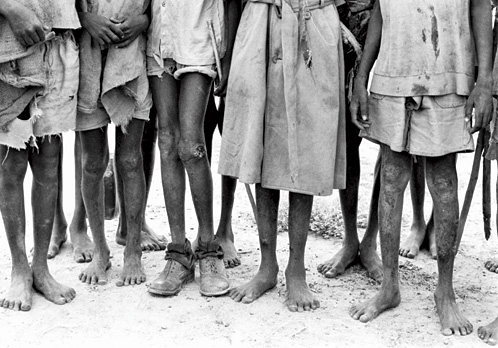
Conditions in the Contraband Camps
The following letter to President Lincoln describes conditions in the contraband camps, where former slaves were housed.
The undersigned, members of the Western Sanitary Commission, most respectfully represent, that the condition of the Freed Negroes in the Mississippi Valley is daily becoming worse, and [that there are] not less than fifty thousand, chiefly women and children, now within our lines, between Cairo [Illinois] and New Orleans, for whom no adequate provision has been made. The majority of them have no shelter but what they call "brush tents," fit for nothing but to protect them from night dews. They are very poorly clad--many of them half naked--and almost destitute of beds and bedding--thousands of them sleeping on the bare ground. The Government supplies them with rations, but many unavoidable delays arise in the distribution so that frequent instances of great destitution occur. The army rations (beef and crackers) are also a kind of diet they are not used to; they have no facilities of cooking, and are almost ignorant of the use of wheat flour; and even when provisions in abundance are supplied, they are so spoiled in cooking as to be neither eatable nor wholesome. [US Slave Blog Editor's Note: Slaves, since the 1700's, lived on a CORN and PORK based diet, therefore they would have limited or no knowledge on how to cook with wheat or beef. The historical record clearly demonstrates that the slaves were given provisions of pork, corn and molasses from the Upper South to the Deep South; therefore, one would conclude that there would be no knowledge on how to cook with food provisions of the Northern Army] Add to these difficulties, the helplessness and improvidence of those who have always been slaves, together with their forlorn and jaded condition when they reach our lines, and we can easily account for the fact that sickness and death prevail to a fearful extent. No language can describe the suffering, destitution and neglect which prevail in some of their "camps." The sick and dying are left uncared for, in many instances, and the dead unburied. It would seem, now, that one-half are doomed to die in the process of freeing the rest....
James E. Yeatman et al. to President Lincoln, Gilder Lehrman Collection, GLC 1545.11

One of the Women had the small pox, her face a per¬fect mass of Scabs, her children were left uncared for except for what they accidentally rec[eive]d. Another woman was nursing a little boy about 7 whose earthly life was fast ebbing away, she could pay but little atten¬tion to the rest of her family. Another was scarcely able to crawl about. They had no bedding. Two old quilts and a soldiers old worn out blanket comprised the whole for 35 human beings. I enquired how they slept, they collect together to keep one another warm and then throw the quilts over them. There is no wood for them nearer than half a mile which these poor children have to toat [sic] . . . hence they have a poor supply, and the same with Water .... [T]he only vessel they had to carry it in was a heavy 2 gallon stone jug, a load for a child when empty . . . . They were filthy and will all probably have the small pox and a number of them likely [will] die.
An agent for the Cincinnati Contraband Relief Commis¬sion conditions in Davis Bend, Mississippi, in 1864. Quoted in James Marten, The Children's Civil War, 131 132.
No comments:
Post a Comment